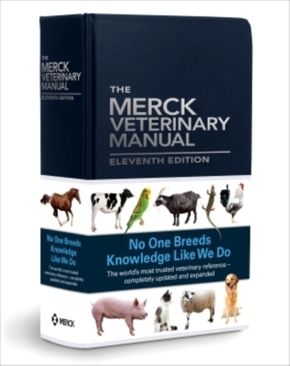
| Verlag | Merck |
| Auflage | 2016 |
| Seiten | 2940 |
| Format | 17,1 x 22,0 x 6,4 cm |
| Gewicht | 1618 g |
| Artikeltyp | Englisches Buch |
| Reihe | Merck Manuals |
| ISBN-10 | 0911910611 |
| EAN | 9780911910612 |
| Bestell-Nr | 91191061EA |
The Merck Veterinary Manual (MVM) covers all domesticated species and diseases in veterinary medicine worldwide. This completely revised and redesigned new edition of the veterinary classic uses a two-column format and color throughout for easy-to-read text and tables. Hundreds of color images enhance and illustrate the text. In addition to extensive revisions and updates, this edition includes a new section on public health and zoonoses, expanded coverage of fish and aquaculture, new chapters on backyard poultry, toxicologic workplace hazards, smoke inhalation, and additional coverage of numerous new and emerging topics in veterinary medicine.
- Completely revised and redesigned in a two-column, easy-to-read format with color throughout
- New section on Public Health which includes a new public health primer that covers One Health, public health functions and agencies, epidemiologic principles and study types, disease outbreak investigations, food safety, and a brief discussion of public health law
- Revised and expanded information on fish, aquatic systems, and aquaculture as well as poultry, pet birds, rabbits, rodents, reptiles, and amphibians
- New chapters on backyard poultry and Tasmanian devils, toxicologic hazards in the workplace for veterinarians, smoke inhalation, scorpion bites, spider flies, and xylitol toxicity
- Extensively revised chapters on heart disease, diagnostic imaging, pharmacology and drug resistance, wound management, equine emergency medicine, management of the neonate and neonatal encephalopathy, wound management, equine arboviral encephalomyelitis, skeletal disorders and myopathies of poultry, and chlamydiosis
- Important changes to the Behavior section such as inclusion of the most recent diagnostic techniques, methods and treatment of behavioral disorders in dogs, cats, and other domesticated animals, expanded coverage of the human-animal bond, service and assistan ce animals, and new material on self-care for veterinarians
